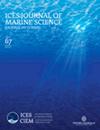Social network analysis as a tool to inform anguillid eel conservation and management
IF 3.4
2区 农林科学
Q1 FISHERIES
引用次数: 0
Abstract
Eel Management Plans demand European silver eel (Anguilla anguilla) escapement to the sea of at least 40% of that expected historically in the absence of human impacts. Landlocked lentic waterbodies, such as drinking water reservoirs, host substantial numbers of eel, which could represent a significant contribution to catchment-based conservation targets. To optimize netting strategies for eel management policies, information on their aggregation behaviour is currently needed but lacking. We performed a fine-scale acoustic tracking study to monitor the movements of 86 European eel in a UK reservoir. Social network sampling and sensitivity analyses were used to assess whether eel aggregate at scales relevant for current capture techniques. European eel were found to aggregate at spatial and temporal scales of 50 m and 2 days, respectively, which complements current capture methodologies and recommendations. Aggregations were not driven by fixed resources, indicating that other factors, such as sociality, may drive aggregation behaviour. Results also show that current netting practices could be optimized by increasing netting lengths from 50 to 80 m. In addition to aiding conservation and management protocols, these results provide an ecological foundation for exploring the role of social behaviour in this Critically Endangered species.将社会网络分析作为鳗鲡保护和管理的一种工具
鳗鱼管理计划要求欧洲银鳗(Anguilla anguilla)向海洋的逃逸量至少达到历史上在没有人类影响的情况下预计逃逸量的 40%。内陆泻湖水体(如饮用水水库)中栖息着大量鳗鱼,可为实现集水区保护目标做出重大贡献。为了优化鳗鱼管理政策的网捕策略,目前需要但缺乏有关鳗鱼聚集行为的信息。我们进行了一项精细的声学跟踪研究,以监测英国水库中 86 条欧洲鳗鱼的活动情况。通过社会网络取样和敏感性分析来评估鳗鱼是否在与当前捕捉技术相关的尺度上聚集。研究发现,欧洲鳗鱼聚集的空间和时间尺度分别为 50 米和 2 天,这与当前的捕获方法和建议相辅相成。聚集行为并非由固定资源驱动,这表明其他因素(如社会性)也可能驱动聚集行为。这些结果不仅有助于制定保护和管理方案,还为探索社会行为在这一极度濒危物种中的作用提供了生态学基础。
本文章由计算机程序翻译,如有差异,请以英文原文为准。
求助全文
约1分钟内获得全文
求助全文
来源期刊

ICES Journal of Marine Science
农林科学-海洋学
CiteScore
6.60
自引率
12.10%
发文量
207
审稿时长
6-16 weeks
期刊介绍:
The ICES Journal of Marine Science publishes original articles, opinion essays (“Food for Thought”), visions for the future (“Quo Vadimus”), and critical reviews that contribute to our scientific understanding of marine systems and the impact of human activities on them. The Journal also serves as a foundation for scientific advice across the broad spectrum of management and conservation issues related to the marine environment. Oceanography (e.g. productivity-determining processes), marine habitats, living resources, and related topics constitute the key elements of papers considered for publication. This includes economic, social, and public administration studies to the extent that they are directly related to management of the seas and are of general interest to marine scientists. Integrated studies that bridge gaps between traditional disciplines are particularly welcome.
 求助内容:
求助内容: 应助结果提醒方式:
应助结果提醒方式:


